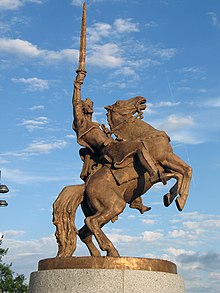Svatopluk of Moravia
| Svatopluk I | |
|---|---|

Statue of Svatopluk on Bratislava castle, Slovakia
|
|
| Prince in Moravia (maybe of Nitra) | |
| Reign | before 867–870 |
| Predecessor | Unknown |
| Successor | None |
| Duke of Moravia | |
| Reign | 870–871 |
| Predecessor | Rastislav |
| Successor | Slavomir |
| Duke of Moravia | |
| Reign | 871–before 885 |
| Predecessor | Slavomír |
| Successor | Himself as king |
| King of Moravia | |
| Reign | before 885–894 |
| Predecessor | Himself as duke |
| Successor | Mojmir II |
| Born | c. 840 |
| Died | 894 |
| Spouse | Svatozina |
| Issue |
Mojmír II Svatopluk II Predslav (?) |
| House | House of Mojmír |
| Father | Bogislav (?), Svetimir (?) |
| Mother | Unknown |
Svatopluk I or Svätopluk I, also known as Svatopluk the Great (Latin: Zuentepulc, Zuentibald, Sventopulch, Old Church Slavic Свѧтопълкъ and transliterated Svętopъłkъ, Greek: Sphendoplokos) was a ruler of Great Moravia, which attained its maximum territorial expansion during his reign (870–871, 871–894).
Svatopluk's career started in the 860s, when he governed a principality within Moravia, the location of which is still a matter of debate among historians, under the suzerainty of his uncle, Rastislav. In 870 Svatopluk dethroned Rastislav, who was a vassal of Louis the German, and betrayed him to the Franks. Within a year, however, the Franks also imprisoned Svatopluk. After the Moravians rebelled against the Franks, Svatopluk was released and led the rebels to victory over the invaders. Although he was obliged to pay tribute to East Francia under the peace treaty concluded at Forchheim (Germany) in 874, he was able to expand his territories outside the Franks' sphere of interest in the following years. His forces even invaded the March of Pannonia within East Francia in 882.
Svatopluk established a good relationship with the popes, and he and his people were formally taken under the protection of the Holy See in 880.Pope Stephen V even addressed him as "King" in a letter written in 885. Svatopluk seems to have wanted to appease the German clergy who opposed the conducting of the liturgy in Old Church Slavonic, and he expelled the disciples of Methodius from Moravia in 886, after their teacher's death.
...
Wikipedia
